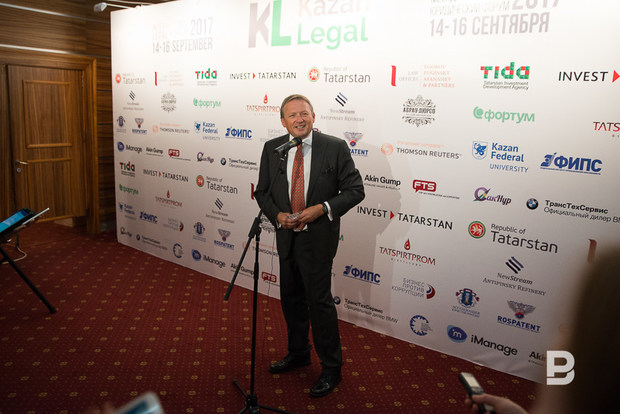Boris Titov: ''Cryptocurrency transactions inside the country must be limited''
The Public Bail Fund for Entrepreneurs will get management during the month. But it won’t start working so soon
The Public Bail Fund for Entrepreneurs that will pay the exit of businessmen who appear in criminal cases on bail during the investigation will confirm its members during the month. But the real mechanism of financial protection of businessmen won't start working so fast, Commissioner for Entrepreneurs' Rights under the President of the Russian Federation Boris Titov told on the second day of Kazan Legal – 2017 International Juridical Forum. Liberalisation of cryptocurrencies and artificial ''offshore'' in Kaliningrad became other important business topics at the forum. Realnoe Vremya tells the details.
Bails against arrests: who will pay
Before the plenary session of Kazan Legal – 2017 International Juridical Forum, the business ombudsman told journalists about the promotion of his idea to create a united public fund that would pay bails for the temporary release of businessmen who appear in criminal cases. The project's author thinks the bail could completely replace the extreme preventive measure as an arrest that is more often chosen towards suspected entrepreneurs (while their business is collapsing).
''Now we are creating it. But it is not an easy task as it might seem at first sight,'' Boris Titov explained. ''On the one hand, it needs to act correctly in terms of legislation and organisation. On the other hand, its financial filling. Today we see that not only very entrepreneurs but also financial institutes and sponsors whom we actively work with are ready to participate in it.''

The business ombudsman told journalists about the promotion of his idea to create a united public fund that will pay bails for the temporary release of businessmen who appear in criminal cases. Photo: Maksim Platonov
Meanwhile, the original scheme of money allocation from the fund was prepared. ''At first glance, the mechanism already exists. There is a basic offer,'' the business ombudsman said. According to him, the scheme needs to be confirmed in documents: ''The council that will confirm the mechanism will be created during the month.'' The main goal is to make this mechanism transparent. Earlier Titov explained that representatives of donors ''who need to give an instruction to a person they trust'' would be in the council of the bail fund.
In this situation, the business ombudsman could call neither accurate launch terms nor financial volume of the bail fund, of course.
Cryptocurrencies by rules
Boris Titov's another initiative is to participate in the creation of a legislative offer to regulate cryptocurrencies in the expert centre in the P. Stolypin Institute of Growth Economy.
Now many countries decide to create blockchain and cryptocurrency infrastructure. Some countries ban these tools and do it quite fast. ''But, actually, it can't be banned. All the state bodies understand it. Blockchain allows to economise money in transactions. This is why we offer the Central Bank to accept it. And game rules need to be created,'' the business ombudsman expressed his opinion. In other words, the country must regulate this process having made so that, in particular, cryptowallets will have the name of a natural person or the company registered in the Russian Federation. In this case, transactions will be transparent. Titov believes that cryptocurrencies won't circulate inside Russia; their transactions inside the country must be limited. And mining needs to be regulated.

''At the same time, nobody argues that cryptocurrencies are a great opportunity to finance our growth,'' Titov stressed. ''It is a new system: now ICO of a Russian mining company at $100 million is taking place that will make equipment for mining of a completely new generation. An average payment is just $1,5 but around the world.''
''The world left offshores''
Boris Titov commented on the fresh initiative of the Russian government to create an offshore zone's analogue in Kaliningrad. ''What a working system should such a zone have to attract money?'' journalists asked.
''The world left offshores,'' the business ombudsman stated. ''The world switched to the creation of effective and attractive conditions inside national jurisdictions. This is why I would be speaking about some special conditions of a special economic zone – so that all the enterprises that registered when the economic zone was put into operation will become its residents,'' Titov concluded.